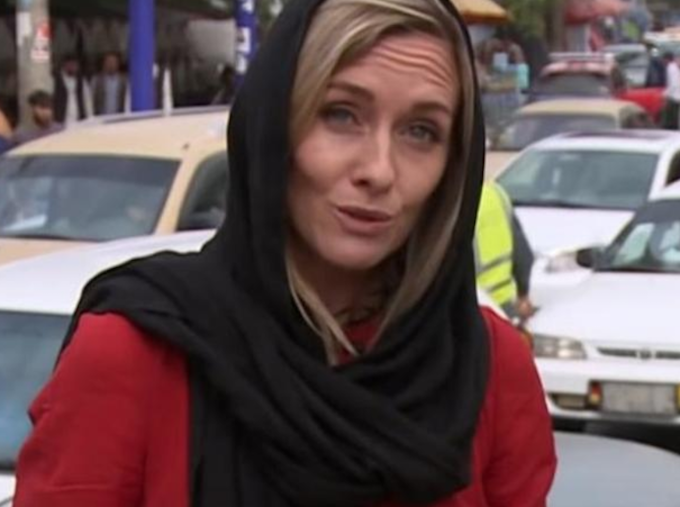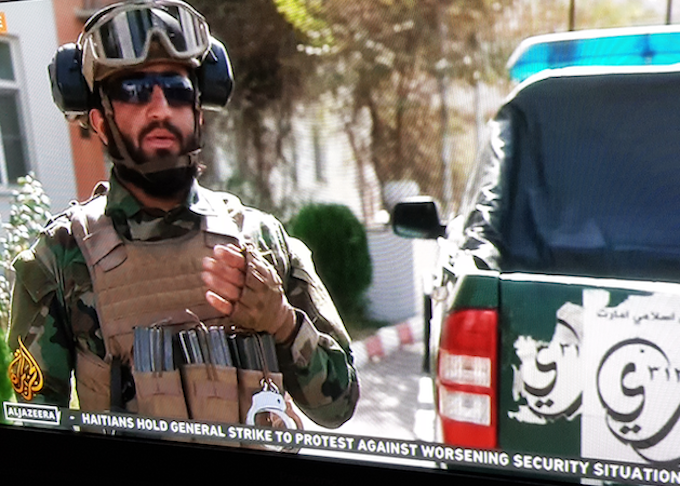
In just a few weeks the situation in Afghanistan has deteriorated sharply as millions cope without desperately needed international aid, New Zealand journalist Charlotte Bellis says.
Bellis is Al Jazeera’s senior producer in Afghanistan and reported on the turmoil in August as the Taliban took over the government and thousands of people tried to flee.
She has dealt with Taliban leaders for a long time, and has sensed a change in their attitudes since they first ruled the country before being toppled 20 years ago.
- LISTEN: ‘I just can’t believe how quickly everything has deteriorated’ – NZ journalist Charlotte Bellis in Afghanistan (Duration 10:12
- READ MORE: Taliban takeover: Charlotte Bellis faces perils outside ‘enemy territory’ — Pacific Journalism Review
She had to leave the country in mid-September because the network feared for her safety and Bellis noted on Twitter that the Taliban were detaining and beating journalists trying to cover protests.
Now she has returned and told RNZ Sunday Morning that she was not worried about her safety.
“The situation here is pretty dire and there are a lot of stories still to be told and I feel invested in what’s happening here and I also just love the country. It’s a beautiful place to be with amazing people and I genuinely like being here.”
However, the country is facing an uncertain future with its population suffering more than ever now that international aid has been cut off.
UN warns of humanitarian crisis
This week the United Nations warned that Afghanistan is becoming the world’s largest humanitarian crisis and Bellis agrees.
“The Taliban took over about two months ago and I just can’t believe how quickly everything has deteriorated.
“People cannot find food, there’s no money, they can’t pay for things, employers can’t pay their workers because there’s no cash, they can’t get money out even from the ATMs.”
Millions of jobs have disappeared, half of the population does not know where their next meal is coming from and already children are dying from malnutrition, Bellis said.
All the aid agencies are appealing to the world to listen.
23 million need urgent help
She is about to go out with the UN Refugee Agency whose teams are organising some aid distribution as the temperatures drop to 2 degC overnight as winter approaches. They are handing out blankets, food and some cash to thousands of the needy in camps in Kabul.
“But it’s such a Band-Aid. There is no way they can reach the number of people they need to reach — it’s like 23 million people who need that kind of assistance,” she said.
Neighbouring countries such as Pakistan and Iran were very concerned, in part because they fear a huge influx of refugees. They have closed the borders to try and keep them away.
The process of getting money and food into people’s hands had broken down, she said, with a lot of it due to United States sanctions.
Three quarters of the country ran on foreign donations before the Taliban took over and that has dried up because no countries are recognising the Taliban’s legitimacy to govern.
Bellis has spoken to one senior Taliban official who said that at recent meetings between the Taliban and the US in Doha the Americans would not tell the Taliban what policies they needed to enact to unfreeze billions of dollars in funding.
“They [the Americans] are playing with millions of people’s lives.”
School problem for girls
She believes some Taliban leaders are pragmatic and would be willing to agree to high school girls being educated but are worried they will alienate their conservative base.
In the main, primary school age girls are able to attend their lessons but the problem is at secondary school level.
“If you’re a high school girl in Kabul it’s awful – sitting around thinking how did this happen. It’s really frustrating and really frustrating for everyone to watch and say this doesn’t make sense.”

Bellis said while she feels safe at the moment, the main problem is the terrorist group, ISIS-K, who have made threats against the hotel where she is staying.
The Taliban have said they will protect guests and have placed dozens of extra guards outside.
ISIS-K is believed to only number between 1200 and 1500 yet they are a potent force with their random attacks, such as beheading members of the Taliban, whom they hate.
She believes the Taliban’s biggest worry is that ISIS will appeal to its most fundamentalist members.
ISIS attracting recruits
ISIS is also believed to be trying to attract recruits who would be trained as fighters and be paid $400 a month which is a substantial amount of money in Afghanistan.
Bellis said she feels guilty staying at a hotel with the scale of poverty and deprivation she is witnessing.
“Right outside the door people are desperate,” she said.
She visited a major maternity hospital in Kabul yesterday and the only medication available for women giving birth was paracetamol.
“Imagine going into labour and thinking, OK if anything goes wrong I’ve got paracetamol. It’s just life and death on so many levels.”
This article is republished under a community partnership agreement with RNZ.
For those of you wondering what you can do to help Afghans.. this @WFP project is the gold standard.
You donate meals direct to Afghans – choosing a set number of meals or month at a time. 🥗🧆🥘🍜 https://t.co/qgmuaTdpfo— Charlotte Bellis (@CharlotteBellis) October 26, 2021











































